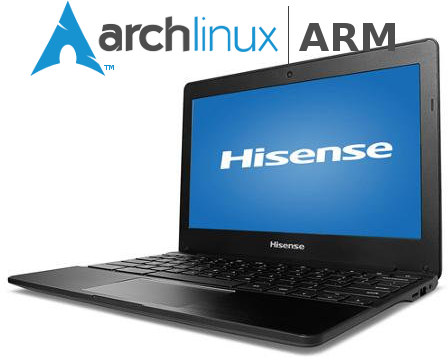Hisense Chromebook C11 is one of the $149 Chromebooks powered by Rockchip RK3288 processor recently launched. So far, I could not find instructions to install any Linux desktop distributions on this type of platform, but now Hisense Chromebook (codename: veyron_jerry) appears to be the first Rockchip platform officially supported by Arch Linux ARM (ALARM).
Hardware video decoding won’t work, 3D graphics acceleration is most probably not working either, and it’s not clear if all hardware parts are supported, and the built-in wireless module is said to break under high throughput, so a USB WiFi dongle or Ethernet adapter is recommended instead.
But at least if you follow the installation instructions, you won’t modify your Chrome OS installation on the eMMC flash, as Arch Linux ARM will boot from external storage, either from an SD card or a USB flash drive, so it should be completely safe to try it out.
If you happen to own a Hisense Chromebook and gave Arch Linux ARM a test drive, let us know how it went.
Thanks to dhead666 for the tip.

Jean-Luc started CNX Software in 2010 as a part-time endeavor, before quitting his job as a software engineering manager, and starting to write daily news, and reviews full time later in 2011.
Support CNX Software! Donate via cryptocurrencies, become a Patron on Patreon, or purchase goods on Amazon or Aliexpress






When will it be available in Europe??? It seems really cool to have a small ALARM laptop !
I have ported Tizen to Firefly-Rk3288 but unfortunately I am not aware of any public drivers for hardware graphics acceleration in Wayland/Weston therefore I cannot run HTML5 applications with Crosswalk as well as QML apps. Running Tizen and other GNU/Linux distributions on these Chromebooks with Rockchip SoC seems as a great idea but unfortunately graphics are a major issue.
My suggestion would be to just give up on ARM from now and go for a small and cheap Intel powered laptop. With those you have very good open source support for everything, 3D, video decoding.
Intel has invested a lot of effort and money into open source and Linux and it shows. ARM on the other hand are just not willing to put any effort into open sourcing the GPU component so I’m sticking with Intel ( or AMD ).
It is actually possible to reuse the mali userspace binaries from ChromeOS. I did some (basic) packaging for me to have a working installer similar to the flashplugin installer [https://plus.google.com/+HeikoSt%C3%BCbner_x/posts/45o7dBkSYum]. WebGL works like a charm and also brings the same performance as on ChromeOS.
Bravo! Well said.
Typing this on my 219 Euro HP Stream 13 laptop (with Intel CPU and GPU) … just installed Ubuntu 15.04 on it, and everything works. 🙂
@Leon
On ArchLinuxARM, Mesa3D drivers (and wayland) are more advanced than on most other distros. There is a really good support for LLVM that make a really descent pure software 3d usable, for simple 3d desktop. Now even some OpenGL application can works (slowly) on OpenGL ES only chips.
Visiting the ArchLinuxARM web site, I just seen the “Asus Chromebook Flip C100P”, that also uses RK3288, should work too.
http://archlinuxarm.org/platforms/armv7/rockchip
@Noloqoq I have to try this image out on my dev board with RK3288.
regarding cheap Intel devices: sure, they are great, I love my open source hardware MinnowBoard MAX but ARM powered devices are leading on the embedded market and their support is really important 🙂
What about power consumption Intel/ARM? Probably battery on ARM device will last longer?
@Peter
Maybe a bit more yes but you’re also not getting the same peak power that a core derived CPU can provide. Even a dual core Broadwell Celeron is much more powerfull than this quad core.
I’m not saying you can’t get ARM to work somehow and it might offer 1h of battery time more but still … I’d rather have everything just work nicely so Intel or AMD are still my choices for now until ARM wakes up and gets it’s act together regarding the GPU part ( or maybe PowerVR will open source their drivers, we’ll see )
Where did you buy it for €219?
@Sander
Intel today does dumping it’s chips to kill the market, they already nearly killed the server market, and they sell server cpu several times the true price, not by quality but by monopol. I personaly prefer to have some closed source gpu (or no 3d) driver instead of having to pay 3 times the price in the futur, and have the choice to choose more efficient electronic device, because, we have only one earth. Today RK3288 is still (without dumping) cheaper, efficient enough fo most tasks, and more energy efficient, making it lighter and less thick.
At Dixons in the Netherlands.
Can verify that this works on the ASUS C201p as well. As to the comments about giving up on arm wrt/ Intel and AMD’s Openness…..let’s just ignore history and forget about all the binary only blobs that these manufacturers *STILL* push out in various bits of hardware, not to mention have a long and storied history of, yeah, let’s just ignore all this…reality stuff.